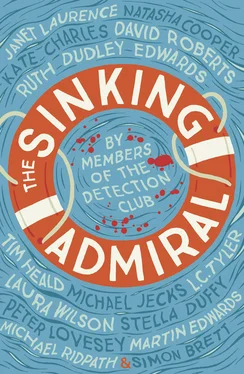In bringing The Sinking Admiral on the arduous journey to publication, I would like to thank David Brawn and Julia Wisdom of HarperCollins for their enthusiasm for the project, the Detection Club’s agent Georgia Glover of David Higham for her support, and particularly Corinne Hitching, the Club’s Assistant Secretary, for managing to take coherent notes from the complicated and frequently hilarious planning meetings between the contributors.
Now it’s over to you, the reader. Hope you enjoy it.
Simon Brett – President of the Detection Club 2001–2015
It’s amazing the attraction television has for ordinary people. Not watching the wretched box, but appearing on it. People seem prepared to undergo any kinds of humiliation for one brief moment of having their faces seen in the nation’s sitting rooms. And that situation’s got worse since the unrestricted spread of so-called ‘reality’ shows.
A demonstration of this syndrome was being acted out at the Admiral Byng pub in the Suffolk seaside village of Crabwell. It was a March Monday, one of those biting cold ones when it seemed that winter would never release its icy hold. The much-quoted view that in that part of Suffolk there was no protection from the cold winds off the Ural Mountains was wheeled out once again in many huddles around village fireplaces. It was a time of year when business at the Admiral Byng would normally have been even worse than usual, but on this particular March day the pub was heaving. And that was because word had got around Crabwell that a television documentary was being made there.
The programme was being fronted and produced by Ben Milne, a journalist in his early thirties, highly skilled in the business of turning cameras on people long enough for them to make fools of themselves. And then working on the footage in the editing suite to make them look even more stupid.
He had cut his teeth on an ITV series called Skeletons in the Cupboard , which tapped into the growing online enthusiasm for genealogy. But, unlike the previous, more benign BBC version of the show, whose high spot was always making the celebrity subject cry, Ben Milne’s programme basically tried to dig the dirt on the celebrity’s antecedents. Illegitimate births were gloated over, appearances in the Newgate Calendar, and transportations to Australia were welcomed with open arms. And involvement in the Slave Trade or a murder enquiry proved to be pure televisual gold. As with many ITV programmes, Skeletons in the Cupboard was a red-top interpretation of the BBC’s more sedate original.
Of course, when discussed by Ben Milne, he was keen to emphasise the series’ serious agenda, and he spoke in just the same way about the documentary he was making in Crabwell. At a time when across the country up to twenty pubs were closing every week, it was, as he would state in his sober-faced introduction, ‘important to focus on the realities of the licensed victuallers’ business, which is why I have brought my cameras to a typical, traditional English pub, the Admiral Byng in Crabwell’. He was a good-looking young man with very short hair and brown eyes, which he knew how to make look caring and empathetic. He switched on their full charm as he told each member of the Admiral Byng’s staff and the regulars how much he hoped his documentary would help save their village pub from the fate of so many others.
Amy Walpole, the bar manager, was not taken in by him. She was red-haired, freckled, tall, thin as a rake, with the kind of supple body that men drool over. And from her position behind the counter she had witnessed much drooling as evenings lengthened and her customers got more drunk. But Amy wasn’t taken in by any of it. Experiences from her varied emotional history had rendered her, now in her late thirties, immune to the manipulations of men. She no longer nurtured hopes – or at least she would never admit to anyone that she nurtured hopes – that somewhere out there was the perfect partner for her. So, while recognising that Ben Milne was attractive, she also recognised that he was not the kind of man to be trusted further than she could throw him. In fact, she thought he was probably a bit of a prick.
Nor was she taken in by his assurances that his television programme would turn around the fortunes of the Admiral Byng. Her job as bar manager made Amy Walpole all too aware of the dwindling profits of the business. Winters were always bad, but none had been as bad as the one that was currently extending its stay into March. All the factors gloomily detailed by the newspapers – general belt-tightening, ever more expensive fuel, the availability of cheap beer and spirits in supermarkets – were having their effects on the Admiral Byng. The rest of the staff weren’t aware of how close to the wind they were sailing, but Amy was kept up to date with bad news by the pub’s owner.
Geoffrey Horatio Fitzsimmons, landlord of the Admiral Byng, must have been well into his seventies. He was never referred to, incidentally, by his full name. The closest anyone got to that was calling him ‘Fitz’. But more often – and perhaps inevitably – he was known as ‘the Admiral’. Certainly that was how all the pub staff referred to him. His bluff manner and drawling vowels, together with his silver hair and moustache, his uniform of gold-buttoned blazer and cravat, gave the impression of a patrician public-school background, but nobody in Crabwell actually knew much about his past. There was also a common assumption, from the way he talked, that at one stage of his life he had been extremely rich. Some of the staff, gossiping in the kitchen, believed he still was.
Well, if that were the case, Amy Walpole knew his wealth didn’t come from the Admiral Byng. She was too close to the account books to believe that. And from conversations with the Admiral she recognised how genuinely anxious he was about the future of his business. The idea that Geoffrey Horatio Fitzsimmons had a vast fortune stashed away somewhere and wasn’t using it to bail the pub out just didn’t make sense. Apart from anything else, although the kitchen and casual bar staff had received their regular stipend, Amy Walpole herself had not been paid for three weeks. The Admiral kept saying he would regularise the situation ‘soon’, but she knew that the money just wasn’t there.
Amy liked her boss. He could be infuriating, though. He was one of those alcoholics who never appears to be drunk, but is just permanently topping himself up. His constant tipple was red wine – preferably something robust and French, he didn’t believe in all this new-fangled New World rubbish – but in the evenings he could also get a long way down a bottle of malt whisky. Laphroaig was his favourite. What effect his lifetime’s drinking had had on his health Amy didn’t like to speculate. The Admiral himself always said that if he gave up the booze his body would drop dead from sheer shock.
He was also, by her standards, something of a Luddite. He didn’t even use a mobile phone. ‘When I’m home people can ring me on the pub number,’ he always said. ‘And when I’m not home they can leave me a message. No telephone call is so important that it can’t wait a couple of hours.’
Fitz’s dinosaur attitudes applied to other technology as well. Amy had had to argue for a long time to persuade him to upgrade his old bar-room till to a more user-friendly electronic model. And her strongest powers of persuasion were also required to get him to buy a laptop and printer for the pub’s tiny office. But the idea of touching either of the devices was anathema to him. Fitz, Amy often thought, would have been happiest living in the 1950s, before any of this troubling technology had become available to the general public.
Читать дальше












